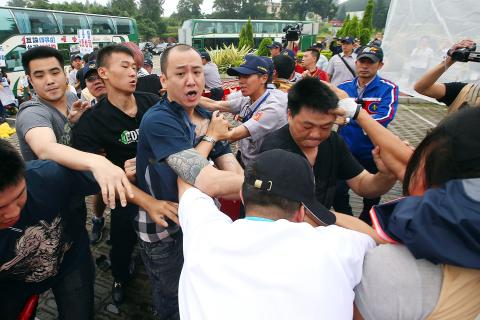Four young people protesting against China’s Taiwan Affairs Office Minister Zhang Zhijun (張志軍) in Kinmen were injured when they were attacked by black-clad men who had gathered to welcome his arrival, Taiwan Solidarity Union (TSU) Department of Youth Affairs director Chang Chao-lin (張兆林) said yesterday.
An attack against a young office worker surnamed Chang (張) resulted in the dislocation of his right shoulder, Chang Chao-lin said at 5pm, when Chang was in the emergency room of Kinmen Hospital for treatment.
Two college students were also at the hospital at that time for treatment after altercations, he said.

Photo: Chen Chih-chu, Taipei Times
One, surnamed Lee (李), suffered lacerations to his right ear after several black-clad men hit him over the head, while the other, surnamed Wang (王), had bruises on his head and hands from beatings, Chang Chao-lin said, adding that he was also kicked in the stomach.
“We were just voicing our opinions within the areas designated by the police as ‘protest areas.’ All of a sudden, about several dozen black-clad men rushed into the area and began to beat us,” Chang Chao-lin said.
The attack began when the group of about 70 protesters organized by the TSU threw a smoke grenade when Zhang’s motorcade passed.
Chang Chao-lin said the grenade was harmless.
“Because we were kept at a distance from Zhang, we had to do something to let him see our demands,” Chang Chao-lin said.
“Go back [to China],” the TSU protesters shouted, holding posters that said Zhang came with “united front” tactics to subdue Taiwan, and expressing opposition to the proposed plan for representative offices on both sides of the Strait and to the bid to join the China-led Asian Infrastructure Investment Bank, which they said would defraud Taiwan.
Zhang arrived at Kinmen harbor at about noon for a two-day visit that began with a meeting with Mainland Affairs Council Minister Andrew Hsia (夏立言).
Zhang was met by a crowd of between 400 and 500 people, including the men dressed in black and people carrying the banners of pro-unification groups, including China Unification Promotion Party, China Production Party and Patriot Association.
Chang Chao-lin accused the police of negligence over the assault.
“There were just four or five police officers stationed around us, even through they had seen several dozen black-clad men with gang tattoos who were watching us from the very beginning of the protest,” Chang Chao-lin said.
The black-clad men who were eventually taken away by the police were later released, Chang Chao-lin said.
“The police caught them red-handed. How could they let them go?” Chang Chao-lin asked.
Hung Chun-yi (洪俊義), commander of the Criminal Investigation Division of the Kinmen County Police Bureau, said that the police detained a man surnamed Wu (吳) and is checking for three other suspects they detained in the video footage taken by the police.
A man in the crowd welcoming Zhang was also injured, Hung said.

SECURITY: As China is ‘reshaping’ Hong Kong’s population, Taiwan must raise the eligibility threshold for applications from Hong Kongers, Chiu Chui-cheng said When Hong Kong and Macau citizens apply for residency in Taiwan, it would be under a new category that includes a “national security observation period,” Mainland Affairs Council (MAC) Minister Chiu Chui-cheng (邱垂正) said yesterday. President William Lai (賴清德) on March 13 announced 17 strategies to counter China’s aggression toward Taiwan, including incorporating national security considerations into the review process for residency applications from Hong Kong and Macau citizens. The situation in Hong Kong is constantly changing, Chiu said to media yesterday on the sidelines of the Taipei Technology Run hosted by the Taipei Neihu Technology Park Development Association. With

A US Marine Corps regiment equipped with Naval Strike Missiles (NSM) is set to participate in the upcoming Balikatan 25 exercise in the Luzon Strait, marking the system’s first-ever deployment in the Philippines. US and Philippine officials have separately confirmed that the Navy Marine Expeditionary Ship Interdiction System (NMESIS) — the mobile launch platform for the Naval Strike Missile — would take part in the joint exercise. The missiles are being deployed to “a strategic first island chain chokepoint” in the waters between Taiwan proper and the Philippines, US-based Naval News reported. “The Luzon Strait and Bashi Channel represent a critical access

CARROT AND STICK: While unrelenting in its military threats, China attracted nearly 40,000 Taiwanese to over 400 business events last year Nearly 40,000 Taiwanese last year joined industry events in China, such as conferences and trade fairs, supported by the Chinese government, a study showed yesterday, as Beijing ramps up a charm offensive toward Taipei alongside military pressure. China has long taken a carrot-and-stick approach to Taiwan, threatening it with the prospect of military action while reaching out to those it believes are amenable to Beijing’s point of view. Taiwanese security officials are wary of what they see as Beijing’s influence campaigns to sway public opinion after Taipei and Beijing gradually resumed travel links halted by the COVID-19 pandemic, but the scale of

Pope Francis is be laid to rest on Saturday after lying in state for three days in St Peter’s Basilica, where the faithful are expected to flock to pay their respects to history’s first Latin American pontiff. The cardinals met yesterday in the Vatican’s synod hall to chart the next steps before a conclave begins to choose Francis’ successor, as condolences poured in from around the world. According to current norms, the conclave must begin between May 5 and 10. The cardinals set the funeral for Saturday at 10am in St Peter’s Square, to be celebrated by the dean of the College